These U.S. Plastic Surgeons Reconstructed the Faces of the Wounded in Ukraine: Exclusive Photo Essay
Through the Face to Face program, which provides pro bono facial reconstruction to victims of war, often-forgotten Ukrainian soldiers have been offered a new lease on life
Just before Thanksgiving, a team of high-profile American surgeons flew across the world to join forces at a military hospital in Lviv, Ukraine. They spent five days performing complicated facial reconstructive surgeries on soldiers severely disfigured while defending their country from Russia's invasion.
“The main purpose of the trip was to train Ukrainian doctors in these really intricate procedures,” Dr. Manoj Abraham, one of the surgeons, tells PEOPLE. This is the team's third visit since the war began on Feb. 24, 2022.
The doctors belong to the Face to Face program, which provides pro bono reconstructive surgery to children with facial deformities caused by birth or trauma and adult survivors of domestic violence in the U.S. The program also helps victims of war in far-flung countries.
“My family are stuck in a war-torn country and people are afraid to visit,” says Dr. Ivanka Nebor, another of the surgeons, who was born in Ukraine and now lives in the U.S. “And then they see people from the States who are not afraid to come and help us. It keeps us going.”
Below, an inside look at Face to Face's powerful work in Lviv, photographed by Sasha Maslov.
Viacheslav Kondrashov
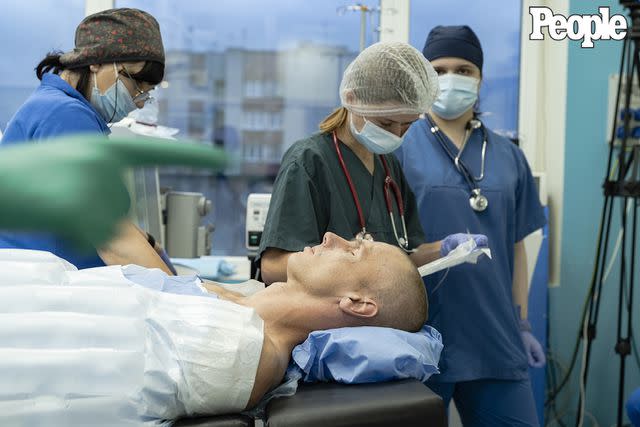
Sasha Maslov
Viacheslav KondrashovViacheslav Kondrashov, 40, was a soldier serving on the border on the day the Russian troops invaded, “so we were straight into it,” he tells PEOPLE. He insisted that his wife, Arina, and 10-year-old daughter, Alina, pack up and go to Germany, and he hasn’t seen them since. He has no recollection of a tank blowing up his vehicle, leaving him with horrific injuries and only one eye.
The American surgeons “cut tendons in my face to make it look more even and took nerves from my leg and put them into my face. It’s all incredible," Kondrashov, pictured above getting prepped for surgery, says. "They left the shrapnel in my left eye because removing it might injure my brain. I have a prosthetic eye so I can pop it in and out!"
He's been fired from military service “because I’m no good to them now,” and hopes to get over to see his family, whom he calls every day. “My daughter desperately wants to come home. I say, 'No, no, go to school. Stay there, it’s not safe.' And just as I say that a siren goes off because the rockets are flying overhead. I miss them so much!”
"I want to thank the doctors," he adds. "We have so many wounded people here that our own doctors just can’t stem the flow.”
Dr. Augustine Moscatello
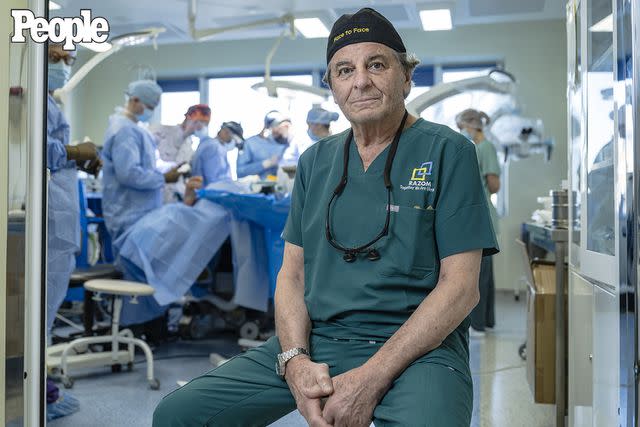
Sasha Maslov
Dr. Augustine MoscatelloDr. Augustine Moscatello, professor of clinical otolaryngology at New York Medical College, has been going on humanitarian missions for the past three decades, paying for the trips out of his pocket. The surgeons bought their own airfare and brought in 15 suitcases of medical equipment — mostly donated — including surgical instruments, antibiotics and anesthetics.
“One of the things we do [at home] is take care of cancer patients to reconstruct the defect — but instead of cancer they’ve got a bullet going through their face," Moscatello, 70, says of his Ukrainian patients. "These are horrendous injuries. They have their eyes destroyed, noses blown off and jaws smashed. Part of our motivation is to make them realize they have support from abroad.”
That the injuries are deliberately inflicted is something he thinks about all the time. “It’s one thing when a hurricane comes in and creates havoc, but this is calculated and rational and can be avoided. It makes absolutely no sense whatsoever," he says. "We should be in an age that’s more enlightened. These injuries are very similar to the ones we see in trench warfare in the First World War.”
Pavlo Melnichenko
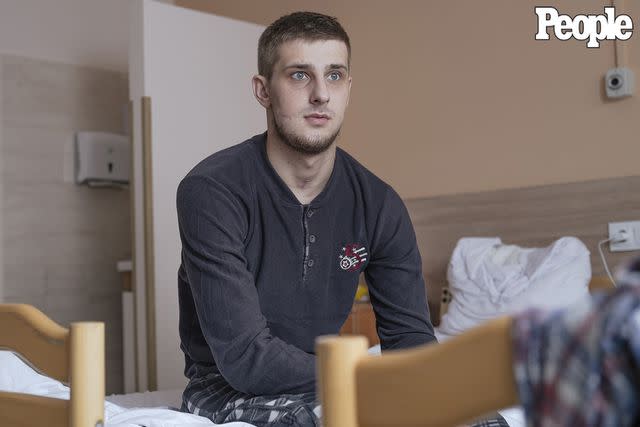
Sasha Maslov
Pavlo MelnichenkoPavlo Melnichenko, 23, was working as a paramedic in an intensive care unit near the Belarusian border when war broke out. He enlisted the same day.
“I was serving in an artillery unit, and on the 29th of July we were being prepared for an exploratory mission in armored vehicles when it was blown up by a tank shell.” They crawled out of their vehicle and made for a nearby trench, but the Russian infantry advanced on him. In a close-range shootout, a rifle bullet tore through the lower half of his face.
“I was lucky it was a bullet and not shrapnel. We were lying in this trench and the cartridges were flying over our heads. It was very frightening, like an American film," he remembers. "I don’t know how long we were there for, but our artillery turned up. ... When they got to me with a stretcher, I was given water and it just fell out of the hole that was the bottom of my face.”
This was Melnichenko's fifth reconstructive operation, and his vision remains at 20% capacity due to a brain bleed. He is seeing a psychologist and takes anti-depressants, but has to be held down at night when he wakes up screaming from nightmares.
“He used to be so happy and sociable,” says his mother, Tamara, sadly. “Now he's a different person. The scars of the war — both emotional and physical — will stay with them for the rest of their lives."
Dr. Manoj Abraham
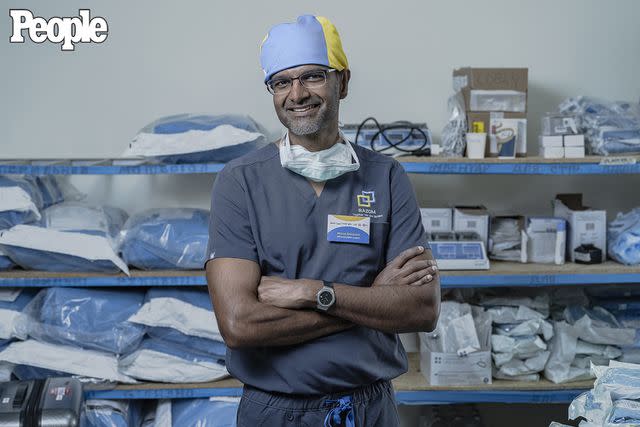
Sasha Maslov
Dr. Manoj AbrahamEsteemed New York plastic surgeon Dr. Manoj Abraham is the former chair of Face to Face, the humanitarian arm of the American Academy of Facial Plastic and Reconstructive Surgery. He is one of a handful of doctors who traveled to Ukraine for the program's latest mission.
“I didn’t tell my Mom I was going this last time. She was very, very nervous and didn’t want me to," Abraham, 53, says. He told her he’d just returned from Ukraine when he saw her for Thanksgiving.
Abraham admits that initially the medical team was afraid of being targeted by the Russians. The State Department warned the team not to travel — “but when we said we were going anyway, they arranged a green zone to get us in with diplomatic clearance.”
“It’s absolutely shocking to see these patients. We deal with post operative facial reconstruction or traumas from car accidents, but these are war wounds and a lot of them have missing limbs too. It’s pretty devastating stuff,” he says.
The main aim of the mission, in his mind, is to teach local doctors to “get up and running — and we might need to do something similar to help people in Palestine. Although my Mom might give me a talking to.”
Vasyl Pavliuk
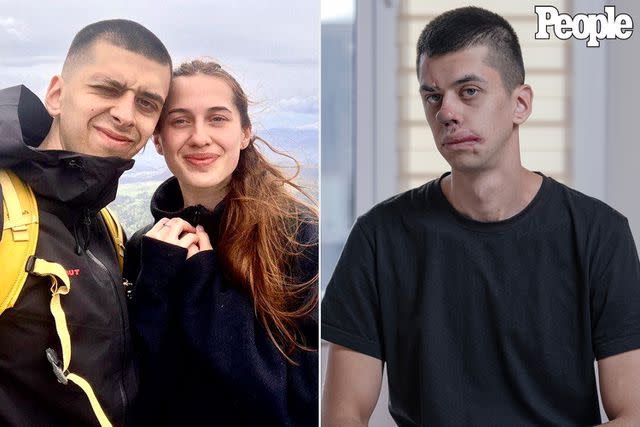
Courtesy Vasyl Pavliuk; Sasha Maslov
Vasyl Pavliuk, with his girlfriend Julia on the leftVasyl Pavliuk, 28, was working as a doctor in his local town of Kolomyia and enlisted the day after war broke out, serving as head of the medical unit with the First Rifle Battalion in Soledar. “It was chaos. No one quite knew what they were doing," he tells PEOPLE.
Recalling the day that his lower face was shredded by shrapnel from an exploded tank shell, Pavliuk says, "We were advancing under crossfire when four of the lads stepped on a mine and their lower limbs were blown off. We stretchered them to the ambulance and I went back to get another wounded man lying on the field. I looked around to see a tank coming at me. I only heard the explosion when it hit.”
He was rescued by soldiers and given a life-saving operation in the local field hospital. After four more operations he was told about the Face to Face mission by friends. “After I was accepted, [the surgeons] asked me if I looked at myself in the mirror what would I want them to change. I said I'd like my nose and mouth put back where they should be."
His girlfriend of two years, Julia (pictured on holiday in the Khomyak mountains before the war), says when she walked into the hospital and saw him soon after he was wounded, “It was still my Vasyl, just a little bit changed.”
While Ukrainian surgeons saved his life, the American surgeons have restored his quality of life. “I feel a lot better about the way I look now. I’m in awe of these doctors.”
Dr. Ivanka Nebor
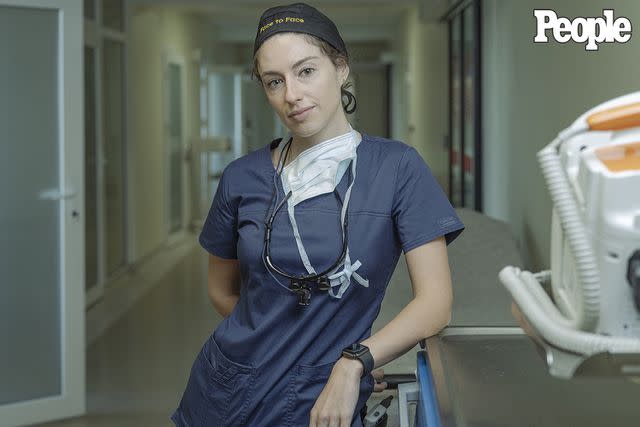
Sasha Maslov
Dr. Ivanka NeborUkrainian-born Dr. Ivanka Nebor, 30, is the founder of a medical NGO INgenius based in Ukraine. “I was really impressed when Face to Face reached out and said they were willing to come here and operate,” she tells PEOPLE, adding that there is emphatic support for the mission in Ukraine.
The surgeon shares that when the American surgeons who are used to civil or medical injuries first see the photos of the patients, “a silence falls on the room. You know they’re thinking, ‘Where can we start on this?’”
Nebor spends time chatting with the patients and finds each story uniquely heart-breaking. ”The war is going to leave scars on souls as well as faces," she says. "Most of them go back into battle… We’re not going to give up.”
Serhii Honchar
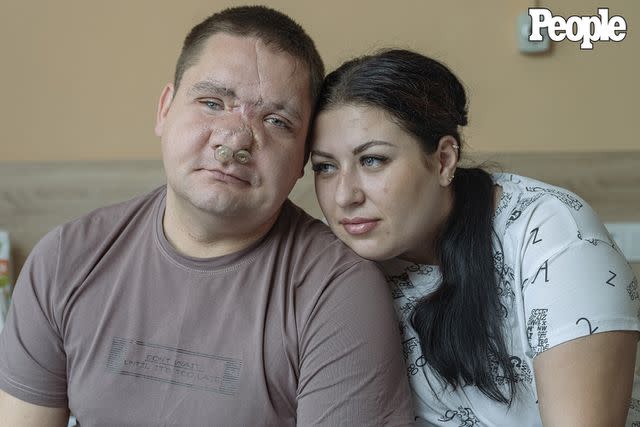
Sasha Maslov
Serhii Honchar and his wife, Irina“On the 24th of February [2022] my mother woke me and said: ‘Son, we’re at war,’ says Serhii Honchar, 32. “I joined a combat unit and in June we were sent to Bakhmut." Remembering the events that followed, he continues, "It was truly terrible there. We came under constant fire day and night and on the fifth day I was hit in the face by shrapnel from a tank round. I don’t want to talk about it.”
Presumed dead, Honchar lay conscious for 24 hours on the battlefield — with what one of the doctors later called “a hole in the middle of his face” — until volunteers saw him moving and took him to hospital. His latest surgery in Lviv was one of 10 carried out over the last six months.
“I surrendered myself into their hands completely. I trust them,” he says. He is hoping to have a further operation performed by the Face to Face team to replace the cartilage in his nose and remove the breathing tubes on their next trip. Until then, “My wife Irina is always by my side."
Dr. John Frodel
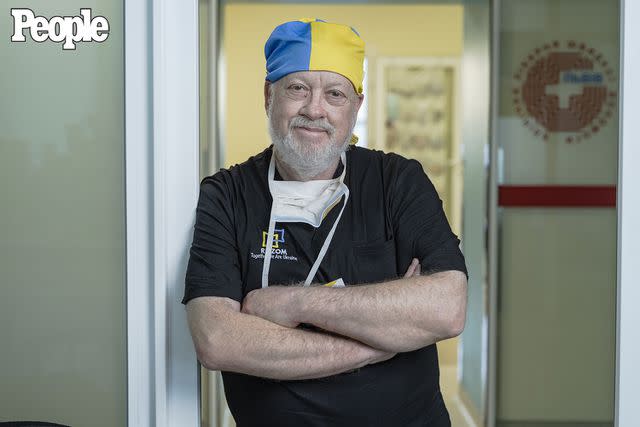
Sasha Maslov
Dr. John FrodelDr. John Frodel, 69, works for the Guthrie Medical Group in Ithaca and set up the Face to Face project with Dr. Abraham. He has been a part of missions to help the war wounded since the 1990s, when he went to Croatia. “War injuries look exactly the same no matter what the decade," he observes.
The missions are exhausting, Frodel tells PEOPLE, with back to back surgeries amid frequent air raid sirens. But spirits are high. “The Ukrainians have a wonderful sense of humor, and you might be a little shocked, but it’s kind of like M*A*S*H. We have a lot of fun. It’s too depressing otherwise.”
The surgeons don’t always have time to get to know the patients or find out how they received their wounds, but Frodel is impressed to hear that many want to get straight back to the frontline “with one arm and one eye.” And he was touched when three different soldiers gave him patches off their uniform: “It’s really meaningful and a big deal for them.”
While operating on one blind soldier during the mission, a Ukrainian doctor who had been talking to the patient rushed out in tears. “He thought you’d be able to make him see again,” she told him afterwards. “We don’t work miracles,” says Frodel.
Andrii Karaulanov
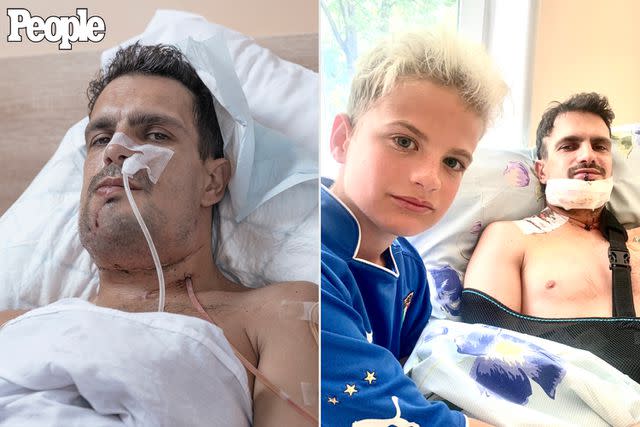
Sasha Maslov; Courtesy Karaulanov family
Andrii Karaulanov, pictured with his son Makar on the rightAndrii Karaulanov met his wife, Anna, 13 years ago, little thinking he would one day be called to defend his country from a Russian invasion. He is still unable to speak clearly, but Anna is happy to talk for him.
“I was so proud of him when he and his friends went to join up,” Anna says. “I signed up as a volunteer too.” Makar, their 11-year-old son, missed him “and cried a lot,” she notes.
Karaulanov had been sent to fight in a combat unit, and Anna lived for his brief phone calls when he would tell her, “I’m alive.” But then the calls stopped. He'd been wounded twice before but had always managed to get word to her. Frantic with worry she texted his friends and was eventually told he’d been in battle when a shell exploded near him, blowing off part of his jaw. She and Makar went straight to intensive care to visit him.
When Anna walked in and first saw her husband, all she could think was how happy she was that he survived. Dr. Abraham operated on Karaulanov, taking a bone from his leg to replace his jaw.
Karaulanov's parents live in occupied territory and haven’t been able to see their son. As soon as he is able, he hopes to go back to the front lines — and Anna approves. “Dear God!" she exclaims. "I just hope our soldiers can hold out against them and win. We don’t want our children to have to go through this horror, the deaths and the fear for our loved ones.”
Dr. Scott Tatum
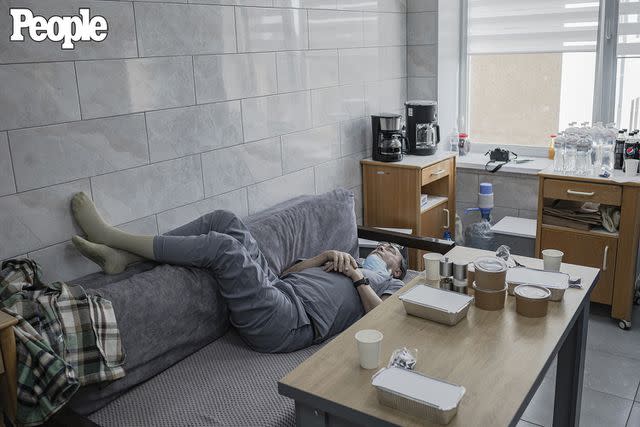
Sasha Maslov
Dr. Scott TatumDr. Scott Tatum, 63, is president of the Face to Face program. “I flew into a small town on the Ukrainian border and took a bus to Lviv,” Tatum says of his latest journey to the Municipal Emergency Hospital. “Sure, we had some concerns about safety, but it’s a calculated risk.”
“Being there reminded me of being a resident again. We were working 12- to 16-hour days and getting five to six hours of sleep a night," says Tatum, pictured above sneaking in a quick nap between operations. "That was a little hard.” Whenever he finishes a mission, the local doctors make WhatsApp calls during their rounds to keep him up to speed on recovery of the patients.
Tatum says Ukrainians are “some of the most brave and resilient people" he's met, adding that during his most recent trip, they taught him about the "horror of war and the power of love."
"One of the things I’m still having trouble reconciling in my mind is that we’re fighting a ground war. That just astounds me," he says. "It’s almost back to World War I and it feels like we haven’t progressed as a species. And they want to go straight back into battle. It seems madness, but what is there about war that isn’t madness?”
Emilian Tovt
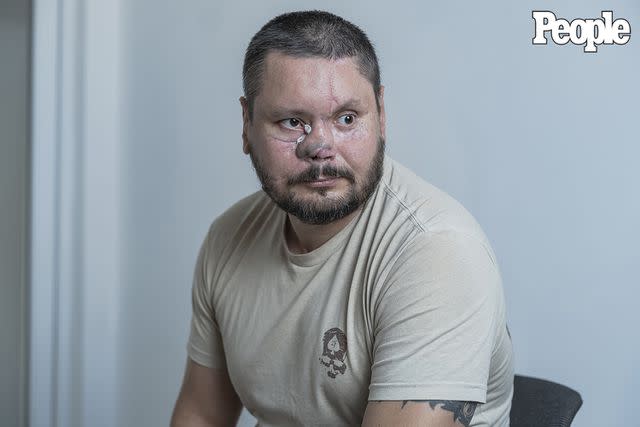
Sasha Maslov
Emilian TovtEmilian Tovt, 41, was working as a businessman in the Zakarpattia Region when Russians invaded. He was told he had to join up. “I hadn’t any military experience and it was all very quick," he recalls.
Tovt was traveling in an army truck as part of a column advancing on Kherson when they came under attack by an anti-tank missile. Lying in a crater, "I could hear the guns coming closer, so I tore off my heavy flak jacket and crawled out to get away. But a tank shell exploded near me, and I was wounded by shrapnel in the limbs, head, neck and stomach. I thought I’d severed an artery as there was blood everywhere and at that moment, I bade farewell to my loved ones.”
He lay there for hours as missiles whizzed overhead, willing himself not to lose consciousness, until finally the shooting stopped and he could be rescued. He later learned that eight of the 12 men in the vehicle with him had been killed outright. “We all grew so close during the war," he says. "Two of them were my childhood friends.”
Tovt's wife applied to the Face to Face mission on his behalf and they were delighted when he was accepted. “They’ll make me look better and straighten up my nose, so I can breathe,” he says. “I trust them.”
Morning Walk-Through
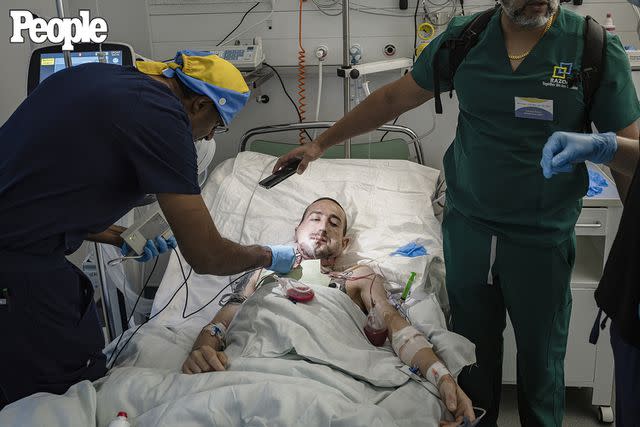
Sasha Maslov
Doctors check on patients in LvivDr. Abraham is joined by fellow doctors during a morning walk-through, checking on patients following surgery.
The 10 American surgeons who traveled with Face to Face spent five intensive days operating on 32 patients. Eight of the operations were major surgeries where tissue was taken from another part of the body and grafted to the injured area of the face.
“It was a real privilege to have the training and resources to share with people who need it,” says Dr. Tatum. “That feels good.”
“The people are great, I’ve fallen in love with them,” adds Dr. Frodel. “I would love to go back in peacetime and meet them in their normal lives.”
For more People news, make sure to sign up for our newsletter!
Read the original article on People.

